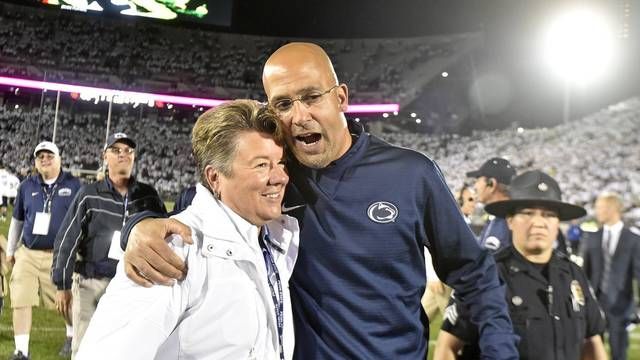
Penn State athletic director Sandy Barbour and coach James Franklin have spent this week looking at different scenarios for the next football season.
Chris Dunn | AP file photo, York Daily Record
Click here to subscribe today or Login.
Sandy Barbour is confident there will be a 2020 college football season. Even if it means playing some or all of it in 2021.
Penn State’s athletic director knows as well as anyone that football fuels an entire department and, to varying extents, the university and State College as well.
So while neither Barbour nor anyone else can determine a timeline for resuming sports as the world deals with the coronavirus pandemic, all options must be considered because of the importance of football for all of Penn State’s 31 varsity sports.
“Clearly football drives the train from a financial standpoint,” Barbour said Thursday in a video call with reporters. “And so we’re looking at whenever we get the all-clear, how do we put the football season in?”
Given that, Barbour would not be opposed to a season that is split between fall and spring semesters or, if necessary, one that is played entirely after the new year.
“I believe it’s in everyone’s best interest, when it’s safe and right to do so, that we play a football season,” Barbour said. “So, if our return fits into a timeframe that we have to do it in a non-traditional part of the year, I think we’ll all look to try to make that happen.”
Penn State’s campus remains shut down as classes are being held remotely, all sports have been called off and the annual Blue-White Game has been canceled. Pennsylvania is under a statewide stay at home order for all of April.
Although there are still five months between now and the Nittany Lions’ scheduled opener on Sept. 5 at Beaver Stadium, the main issue is giving players adequate time to prepare to play a season.
Barbour and her staffers discussed that very issue this week and the determination was made that at least 60 days are necessary for players to be able to ramp up from workouts to practices to actual games for the purpose of injury prevention.
“We’ve relied on our sport science folks, strength and conditioning — what we call our performance team — our head team physician, to really look at this from a health and safety standpoint,” Barbour said.
“For football, we think that 60-day window is about right.”
That would mean, ideally, players could return to campus by July 7 to get started with preparations to start the season on time.
But at the moment, it’s impossible to guess how feasible that might be as cases of COVID-19, the respiratory disease caused by the new coronavirus, rapidly increase.
Already this week Big Ten peer Ohio State has announced that all classes will be held online through July — not an encouraging sign for a return to normalcy by that point.
Penn State has not made any decisions that far in advance yet, but the school’s response will be dictated by health and government officials.
To Barbour, that means that one proposed alternative — playing games with limited or no crowds — isn’t a good solution. If it isn’t deemed safe for fans to gather, then getting hundreds of football players, coaches and staffers together won’t work either.
“Whether it’s students or whether it’s student-athletes, they’re not coming back to campus until it’s safe and healthy and prudent to do so,” Barbour said. “So I’m not sure whether a situation where it it’s not wise or prudent to have folks in the stands marries up with that it’s OK to have students back on campus.”
So other contingency plans must be discussed. Several national media outlets polled athletic directors this week about alternatives, with ideas floated from delayed seasons to shortened seasons with no non-conference schedule.
An all-spring semester football season would mean starting in January or February with a national title game played around Memorial Day.
None of those options are particularly appealing to fans, coaches or administrators. And in some parts of the country, the prospect of an altered college football schedule is being used as a carrot to get people to comply with guidelines to end the health crisis more quickly.
Nebraska Gov. Pete Ricketts got right to the point for Cornhuskers fans on Thursday, saying, “If you want to see (Nebraska football) this fall, you’d better comply with social distancing measures.”
Regardless of when it happens, college football will return. And administrators are working to make sure of it.
“We’ll be back,” Barbour said. “This is not about sport. This is far, far bigger than sport. But sport absolutely will play a huge part in bringing all of our community together again when the time is right.
“… And when it’s time to do so, when it’s safe to do so, we’re gonna do it. We’re gonna do it in a big way.”




